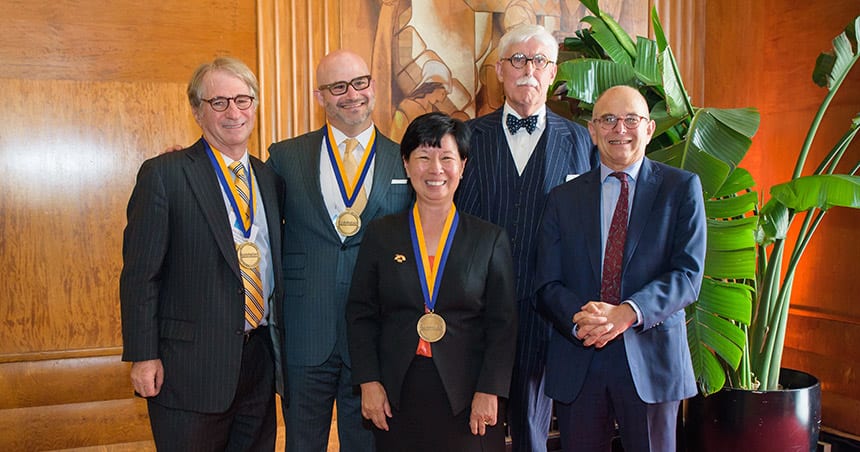
By Andrew Cohen
For Benson Cohen ’04, Berkeley Law “changed the trajectory of my life in a way I can’t really quantify.” For Holly Fujie ’78, it “added immeasurably to the quality of my life and career.” For James McManis ’67, it “gave me the gift to do what I think I was called to do.”
Such sentiments permeated the annual Citation Award luncheon June 13 in San Francisco. Fujie and McManis received the Citation Award (Berkeley Law’s highest honor), Cohen the Young Alumni Award, David Lieberman the Faculty Lifetime Achievement Award, and Barry Scheck ’74 the Judge D. Lowell Jensen and Barbara Jensen Public Service Award.
“As I listen to the wonderful words of each recipient, I realize again what makes our law school so special—it’s the community we are,” Dean Erwin Chemerinsky said.
A California Superior Court judge in Los Angeles County since 2011, Fujie joined the bench after a stellar career in corporate civil litigation. A tireless advocate for Berkeley Law who mentors students and alumni and helps recruit prospective applicants, she is also a past president of the school’s alumni association. The third woman and first Asian-American president of the State Bar of California, Fujie has won numerous awards for her efforts to promote gender and ethnic diversity within the legal profession.
“I literally owe my entire life, not just my professional life, to Berkeley Law,” said Fujie, who met her husband there (Lee Cotugno ’77). She described her first law school class with iconic professor Herma Hill Kay—“who basically taught Ruth Bader Ginsburg everything she knows about sex-based discrimination”—and how that foreshadowed the many renowned professors she had.
“These people were giants in the middle of tremendous work out in the community and the world,” Fujie said. She recalled a visiting property professor “sobbing throughout his last class because he had not been invited to return the following school year. I knew I was in the right place, where people wanted to be.”
McManis, alumni association president right before Fujie, co-chaired his 50th class reunion and has long been a generous supporter of the school. The founder of McManis Faulkner in San Jose, his firm and prominence as a top trial lawyer developed in parallel with the rise of Silicon Valley.
The recipient of many honors, McManis represents companies with commercial, trade secret, and intellectual property issues. He also works with individuals in cases involving civil rights, family law, employment disputes, and criminal defense.
McManis confessed that his law school path was fueled by how “the government offered an all-expense paid trip to Vietnam that I thought I’d just as soon postpone. I came to Berkeley and it was like a whole new world … I thought I’d died and gone to heaven and I’ve never lost that feeling at all.”
A partner at Sidley Austin in New York City, Cohen is a prominent authority on corporate, securities, and regulatory issues as well as matters relating to mergers and acquisitions. A strong voice for protecting and advancing the rights LGBTQ people and those with HIV, he serves on Lambda Legal’s National Leadership Council.
Cohen helped helped create the Berkeley Business Law Journal as a student, and has been an alumni association board member for more than a decade. He regularly travels across the country to attend board meetings, hosts alumni and admitted student events in New York, mentors minority law students, and serves as a class reunion leader.
“Going to Berkeley offered me the opportunity to see a different world,” says Cohen, an Atlanta native. “Not just physically but in terms of diversity of thought and the people I got to meet. They challenged assumptions I had not only about school but about politics, business, the environment, and LGBTQ issues that had all been part and parcel of my life.”
Described by Chemersinky as “one of the most treasured members of our faculty,” Lieberman is an expert in the history of political ideas and British and European history. Calling his path to Berkeley Law “somewhere between exotic and implausible,” he said he joined the faculty in 1984 “clueless, having never studied law or sociology. I got away with it because of the constant instruction and advice I received from my colleagues, and also from the insights, stimulation, and frankly inspiration from our students, who are people of such conviction, ambition, and intellectual excitement.”
In addition to his teaching and scholarship, Lieberman has served as associate dean of Berkeley Law’s Jurisprudence and Social Policy Program, directed its Kadish Center for Morality, Law & Public Affairs, and chaired the undergraduate Legal Studies Program.
“This is a humbling moment when I think about the contributions and accomplishments of the others receiving awards today and when I recall the many colleagues who previously won this award,” Lieberman said.
Scheck, one of Berkeley Law’s most renowned graduates, has represented high-profile clients such as Abner Louima, Hedda Nussbaum, O.J. Simpson, and Louise Woodward. A first-generation college graduate, after law school he became a public defender in the South Bronx and also began teaching at Cardozo School of Law, where he is now a professor.
Seeing an opportunity to reliably move DNA science into the forensic arena, Scheck and his law partner Peter Neufeld created the Innocence Project in 1992. Since then, 365 wrongfully convicted people have been exonerated through DNA evidence. The group also works to safeguard against unreliable jailhouse informant testimony, inadequate defense, forensic science misapplication, government misconduct, false confessions, and eyewitness misidentification.
“I’m so lucky and thrilled to get this award,” said Scheck, former president of the National Association of Criminal Defense Lawyers. “I have great friends from this law school.” Calling for a “Marshall Plan for public defense” to reduce mass incarceration, Scheck also addressed Chemerinsky directly: “Erwin, you are one of my heroes. You always have been and always will be … I’m proud to receive this from you.”